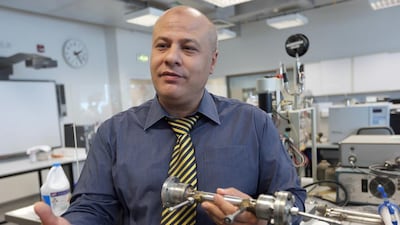AL AIN // The island of Das, about 160km off the coast of Abu Dhabi, is remarkable in a number of respects.
It lies at the heart of one of the emirate’s offshore oilfields, and as such it is a major hub for refining. And it is tiny – just 2.5 square kilometres. And that means that, square metre for square metre, it is valuable.
“They call it the most expensive land on earth,” says Dr Sayed Marzouk, a professor of chemistry at the University of Al Ain. “I think it’s more expensive than Manhattan because of space limitations, with four major oil and gas producers using it.”
Dr Marzouk is among a group of researchers at the university who have been spurred by Das and a handful of places like it to conduct some groundbreaking research in the way Abu Dhabi refines its oil – and their work is on the cusp of entering an exciting new phase.
Put bluntly, he says, “in some situations, the size matters”.
His team is developing a low-cost oil refining system that not only uses less power, but requires vastly less physical space than conventional systems.
The core technology behind the refining of oil and gas has remained little changed for decades. Both crude oil and natural gas are made up of hydrocarbon chains of different lengths. Each length of chain has a unique molecular weight and, crucially, unique boiling and melting points.
Heat the oil up, or cool it down, slowly, and as the temperature changes you will be able to vent or skim off very pure fractions of each component chemical.
But this uses an enormous amount of power, and the heat and pressures required are such that very strong – meaning very big, very expensive – refining vessels are required to contain them.
And there are problems with impurities. Along with useful hydrocarbons, natural gas contains hydrogen, carbon dioxide, sulphides and other impurities that need to be removed.
In current systems, they are cleaned out with solvents – but that produces a waste product that is highly toxic and cannot simply be dumped. It must be treated and regenerated, which itself is an energy-intensive and expensive process.
In the case of gas refining in particular, all this has to be done at pressure – almost 25 times the pressure of the air in car tyres, according to Dr Mohamed Al Marzouqi, a professor in chemical and petroleum engineering at the university.
“Currently, the Abu Dhabi National Oil Company uses large absorption towers in which carbon dioxide and hydrogen are removed from natural gas because it has no value with their presence,” said Dr Al Marzouqi.
“So the idea is to reduce this cost and the energy that is related to this cost. If we can, then we can eliminate some environmental problems too.”
About a decade ago, the scientists set about looking for a different way to clean out the pollutants and separate the hydrocarbon components – preferably one that reduced the need for expensive heating, equipment and land.
What they came up with was a system that uses porous membranes instead of heat to separate the components. The gas or crude oil is passed through a long tube of a porous polymer membrane. The membrane’s pores are finely calibrated to allow only one component of the gas through; the rest passes to the next stage of separation, which can be either a membrane with different pores to capture a different fraction or some other processing. By the end, the crude product has been separated into its various fractions, each of which can be ‘mopped up’ with solvents.
The project has received several grants over the past decade. The Japan Cooperation Center, Petroleum (JCCP) funded the start of the project to remove carbon dioxide and hydrogen sulphide from natural gas. It was followed by Dh170,000 from an Emirates Foundation grant in 2011 to demonstrate the technology’s separation of hydrocarbons from gas.
Last year, the National Research Foundation gave the university Dh200,000 for three years to start making its own membranes, and the college of engineering has provided another Dh200,000 this year for further research.
And so far it looks like a winner, using almost a third less energy, and taking up just a fifth of the space of a conventional system. Overall, it manages to purify natural gas for about 80 per cent of the total current cost.
“About 90 per cent of the operating cost in the industry is the cost of energy,” said Dr Al Marzouqi. “So if we can eliminate 30 per cent, that’s a huge cost for them.”
Now the team is hoping to set up a 36-square metre pilot plant in one of Adnoc’s fields. Once Adnoc clears the proposal – expected by the end of this year – the plant should be up and running in three years.
In the meantime, a major company providing products in advanced high-technology manufacturing, Entegris, has expressed interest in the university’s technology. “We managed to convince a giant company like Entegris to build a prototype based on our technology,” said Dr Marzouk. “They believe, as we do, that this will come to the gas industry soon.”
And they will continue to try to reduce the cost and energy consumption further. “There is no end to ambition in science,” he added. “If we can reduce the cost and energy by 30 cent, we can increase that number and make the technology smaller in size, too.
“It’s not easy to convince the natural gas industry because it’s a very big industry, you’re talking about billions. But this is very promising and we hope that, one day soon, the UAE will implement its own technology in this important industry.”
And all of that means that, one day, there might just be a bit more room to breathe on Das.
cmalek@thenational.ae

